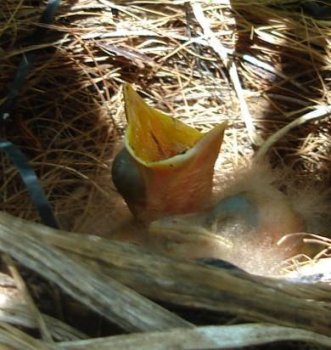
This is an old Irish poem called "It Is Sadly the Blackbird Calls."
Its author is anonymous and it was probably written in the 1100's
with parts of original translation by David Greene and Frank
O'Connor. Blackbird is the common name in North America of a
perching bird allied to the bobolink, the meadow lark, the oriole,
and the grackle. The European blackbird is a thrush. While black predominates, bright reds
and yellows are conspicuous on several species.
This poem compares the plight of the blackbird to the plight of the Irish.
The European Blackbirds build cup-shaped nests, sometimes lining
them with mud. The mother lays two to five speckled eggs that she incubates. Sometimes she lays
two or more clutches per year. Both parents help in raising and feeding the young.
The songs of some species, including members of the genera Catharus, Myadestes, and
Turdus, are considered to be among the most beautiful in the avian world,
heard at dawn, dusk, and after a rain shower. The female builds the nest in a conifer at
the base of a branch against the trunk, usually 5-15 feet off the ground. The nest is a
bulky, open cup made of twigs, moss, leaves, and pieces of bark, lined with soft grass and
rootlets. The female lays 2-5 eggs that she incubates. Both parents feed the young.
These birds grow very tame and even after they have left home, tend to come back for a
visit.
While some large birds like the eagle or parrot can
live 30 to 80 years, the little guys such as wrens, blackbirds etc. usually have lifespans
of 7-8 years.
Some individual birds have survived surprisingly long, including a cardinal (13.5 years),
One red-bellied woodpecker survived in the wild for 20.5 years!
Captive birds, protected from the hazards of nature, have much longer life spans.
Courtesy of Jack & Vivian, IrishPage.com January 2026
This is a poem for which there is no music.
Cumhthach labhras an lonsa,
an t-olc do fhuair d'fheadarsa
cidh bé do théalaigh a theagh
is fá éanaibh do hairgeadh.
An t-olc fhuairsean a-nossa
ní cian uaidh ó fhuarassa
maith m'aithne ar do labhra, a luin,
a haithle th'adhbha d'argain.
Do chridhese, a luin, do loisc
a ndearna an duine díchoisc--
do nead gan éan is gan uigh
sgéal is beag ar an mbuachail.
Tigdís fád ghothaibh glana
do muinntir nua a-nallana
éan noch dtig as to thaigh
tar béal do nid ba neanaidh.
Do mharbhsad buach aille bó
do chlannsa uile i n-aonló
ionann sódh damhsa agus duit
mo chlannsa ní mó maraid.
Do bhí ag ingheilt go hadhaigh
leithéan an eóin allmharaigh,
do-chuaidh ar an sás iar sin
go bhfuair bás leisin mbuachail.
A Fhir do chum an cruinne
doilig linn do leatruime;
na caraid atá rér dtaoibh
maraid a mná is a macaoimh.
Táinig sluagh sídh 'na sidhe
do mharbhadh ar muintire;
gion go ró gádh mé ón ghuin
nocha mó ár ó armaibh.
Cumha ar mná, cumha ar gclainne
tréan a imshníomh orainne;
gan a slighe a-muigh 's a-mach
do thuil mo chridhe cumhthach.
It is sadly the blackbird calls,
the wrong that is done him I know.
The cowherd took his house
and killed his little birds.
The wrong done to him now
was also done to me.
Well I understand you, blackbird,
after the wreck of your house.
Your little heart, O blackbird,
is burning with what that rough man did--
your nest without birds, without eggs,
the story is little to him.
Your newborn children used to come
at your clear call;
now no fledgeling comes out of your house.
Nettles grow over the entrance.
The cowherds killed all your children
in a single day;
the same thing to you and to me--
my children live no longer.
The mate of the bird from across the sea
was feeding until nightfall.
Then she went into the trap
and was killed by the cowherd.
O Man who made the world,
I resent your favoritism.
At the sides of my friends
their wives and children still live.
A fierce host of immortals
came to kill our people.
I am not in danger
but violent death is no worse.
Sorrow for our wives, sorrow for our children
is a strong torment.
Without their going in and out
my heart is full of grief.
 To our left is a fledgling blackbird in the nest.
To our left is a fledgling blackbird in the nest.
Replay background music:
a Lament

Click icon above to go back to poem index